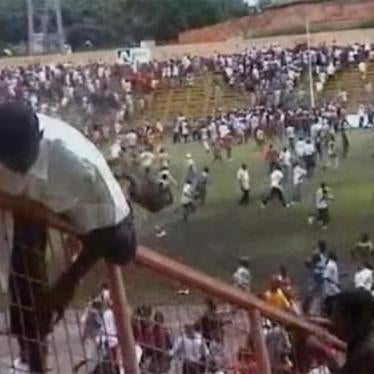As the trial opened on September 28, 2022, the courtroom was packed with victims and their family members and the media. The crimes of each accused were read aloud, and the judges confirmed that defendants were represented by lawyers. The proceedings generally took place three days a week, Monday through Wednesday, with the exception of holidays, judicial recesses, one six-week suspension, and several shorter postponements.
Hearing of the Accused
In the first days of the trial, the judges considered and rejected several claims of unfair treatment raised by defense counsel, including that the accused had not been individually informed of charges against them and a lack of proper basis for detaining Dadis Camara, according to trial observations organized by Human Rights Watch. Dadis Camara also argued unsuccessfully that he should be placed under house arrest instead of being held in detention.
Over the next four months, the court heard from each of the 11 accused, with judges, defense lawyers, and lawyers of the civil parties having the opportunity to question the accused. Some of those accused highlighted their prolonged pre-trial detention. Others said they had requested provisional release without success.
Some accused placed responsibility for the crimes on their fellow accused, saying that they were not in the stadium at the time the violence took place, or lacked relevant authority to oversee the actions of others or give them orders when the crimes were committed. This included Cece Rafael Haba, Ibrahima “Kalonzo” Camara, and Claude Pivi, all of whom said they were not present in the stadium. Paul Mansa Guilavogui denied accusations against him, contending that he could not stop torture because he was a subordinate, and not a person of command or authority.
Hearing Victims and Witnesses
The second phase of the trial started in February 2023. During this phase, the judges began hearing from victims who are civil parties in the case.
Judges heard more than 100 victims out of over 700, who are civil parties in the case, according to an activist and a lawyer involved with the trial. Former opposition leaders, other individuals who were at the stadium during the attack, and family members of those who were at the stadium, are among the victims who took the stand.
Survivors of rape and sexual violence were among those who testified. Most victims of sexual violence testified in closed session. There was a major problem when the court breached the anonymity of the first sexual violence survivor, who had asked to testify in a closed session, but was told by the judges to identify herself before they made a decision. This situation has not been repeated.
One victim of sexual violence, Fatoumata Barry, opted to testify publicly “to share with the world and [her] nation” the horrors that she—and a hundred others—experienced on September 28, 2009.
Victims of other abuses, including shooting, torture, beating, assaults, and mistreatment have been required to testify publicly. Although, a law on protection of victims was adopted just before the start of the trial in 2023 that does not restrict testimony in closed session to those who experienced sexual violence.
The first victim to testify was Oury Baïlo Bah, who spoke about his younger brother who was killed at the stadium, and whose body has never been found. Another victim, Fatimatou Diallo, testified that she had a phone conversation with her husband when he arrived at the stadium, but later learned that he had been shot and died, though his body has not been found.
A request by Marcel Guilavogui, one of the accused, to take the stand a second time paused the hearing of the victims. Following Guilavogui’s additional testimony, during which he recanted some of his earlier testimony about not being present at the stadium, victims returned to the stand.
The third phase of the trial started in November 2023, during which over a dozen witnesses who are not civil parties, including former high-level government officials, testified.
The former chief of the armed forces’ general staff, the gendarmerie’s chief of staff, the general director of the police, and the former adviser of the president are among the witnesses. Some testified about orders officials received on the eve of the massacre or offered information related to officials sending military vehicles to transfer the bodies of demonstrators from the stadium after the attack.
During the witnesses’ hearings phase, the prosecution called 14 witnesses out of over 30 expected witnesses who had testified before the investigative judges ahead of the trial, according to Guinean media.
Three witnesses then testified for the civil parties, including one who testified in a closed session, and one witness was called by the defense.
Video and Audio Evidence and Reclassification of Charges Request
Following the conclusion of the witnesses’ hearings in February 2024, judges viewed video and audio evidence captured around the 2009 events.
It was in response to the video and audio evidence that the prosecution on March 4, 2024, requested reclassification of the charges from ordinary crimes to crimes against humanity.
Judicial Visit to Mass Graves Request
In April 2024, the prosecution, supported by civil parties’ lawyers, also sought a “judicial transfer”—a physical visit by the court to alleged locations of mass graves, where scores of bodies connected to the stadium massacre are claimed to have been buried. The judges rejected the request, without providing an explanation. In February 2023, one victim’s lawyer requested a judicial visit to a potential mass grave site during the trial.
Confrontations
Over two weeks in April 2024, the judges conducted the “confrontations” phases. Judges and all parties posed questions to some of the accused as well as to victims and witnesses, with a view to reconciling inconsistencies in earlier statements.
Closing Arguments
The trial entered its final stage on May 13, 2024, where all parties presented their closing arguments (plaidoirie). Thirteen lawyers acting for the civil parties were followed by the prosecution team, and the defense counsel for the 11 accused.





